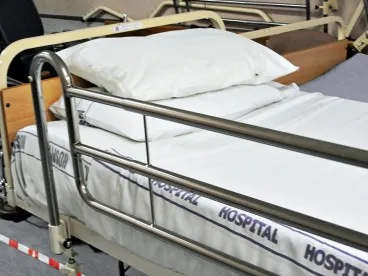Massachusetts regulators issued several updates since last Friday.
Hospital Bed License Expansion
On Sunday, March 22, 2020, the Massachusetts Department of Public Health (DPH) announced it is allowing bed license expansion within hospitals to accommodate the surge of patients requiring care for COVID-19 and indicated it would accelerate any requests to license units in buildings that are not currently licensed for hospital services. The announcement referenced the March 13, 2020, “COVID-19 Emergency Declaration Health Care Provider’s Fact Sheet” issued by the Centers for Medicare and Medicaid Services (CMS), which waived certain requirements in order to allow acute care hospitals to house acute care patients in excluded distinct part units containing beds that would be appropriate for acute care inpatient care.
Under the DPH guidance:
If acute care hospitals have more patients requiring admission than licensed inpatient beds, then hospitals may use alternate acute inpatient space and increase their capacity to higher than the licensed bed count in accordance with their emergency management plan. Acute care hospitals may use alternate acute inpatient space that would be appropriate for inpatient care, including but not limited to: post-anesthesia care unit beds, beds out of service, and inpatient rehabilitation units.
The beds are required to:
- be equipped with medical gases (one oxygen outlet and one vacuum outlet for each bed),
- be spaced at least six feet apart from another bed, and
- have access to hand washing sinks and privacy partitions.
As DPH noted, this “does not authorize a hospital to establish beds or units in a building that is not currently licensed for hospital services. DPH will accelerate any requests to license units in buildings that are not currently licensed for hospital services.”
Hospitals are also encouraged to group confirmed cases of COVID-19 in the same care area(s) and create dedicated healthcare personnel care teams. If, in an effort to create dedicated care areas and healthcare personnel care teams, identified intensive care units and general care units are consolidated as a functional unit, then patients with confirmed cases of COVID-19, regardless of their acuity, may be cared for in any bed in this functional unit. Acute care hospital providers should use their clinical judgment to determine the appropriate number of healthcare personnel and competencies needed to safely care for patients in this functional unit.
Personal Protective Equipment
On March 22, DPH also posted additional guidance for providers and first responders on recommended use of PPE, and government efforts to coordinate additional PPE resources for providers and first responders. Links have been posted below.
Guidance For Prioritization of Personal Protective Equipment (PPE) in Massachusetts
MA COVID-19 PPE Guidelines and Priorities (3/22/20)
MA COVID-19 PPE Request Process Chart
Allowance of Ambulance Transport to Designated Alternate Sites on Hospital Grounds
On March 20, 2020, DPH issued guidance to Massachusetts-licensed ambulance services clarifying, among other things, that any tents or alternate spaces designated by hospitals on their grounds for receiving suspected COVID-19 patients, will be deemed extensions of the hospital emergency department for this purpose. According to the guidance, EMS personnel are authorized to bring suspected COVID-19 patients by ambulance to such alternate sites. DPH referenced Circular Letter DHCQ 20-03-701: Authorization and Guidelines for Use of Alternate Space for Treatment of Ambulatory Patients Presenting with Possible COVID-19. In that guidance, DPH encouraged hospitals to identify appropriate alternate space to accommodate a surge in patients requiring COVID-19 screening as part of emergency management/disaster planning. Per DPH, hospitals may identify and use existing inpatient, outpatient, and non-patient space for this, consistent with the guidelines attached to the Circular Letter.



 />i
/>i

